'110 percent sure': Jurors say no doubt in Abshire's guilt
-
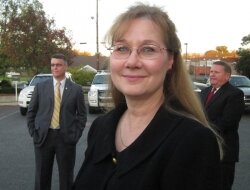 Orange County Commonwealth's Attorney Diana Wheeler, flanked by Virginia State Police special agents Mike Jones, left, and Dennis Dodson, right, smiles outside the courthouse following the first-degree murder conviction of Eric Dee Abshire.Courteney Stuart
Orange County Commonwealth's Attorney Diana Wheeler, flanked by Virginia State Police special agents Mike Jones, left, and Dennis Dodson, right, smiles outside the courthouse following the first-degree murder conviction of Eric Dee Abshire.Courteney Stuart -
 Eric Abshire's court appointed defense attorney Charles "Buddy" Weber leaves the courthouse following the verdict.Courteney Stuart
Eric Abshire's court appointed defense attorney Charles "Buddy" Weber leaves the courthouse following the verdict.Courteney Stuart -
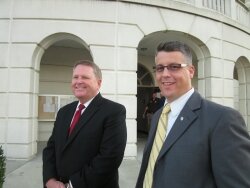 Virginia State Police Special Agents Mike Jones, right, and Dennis Dodson, recounted thousands of hours spent investigating the case over five years.Courteney Stuart
Virginia State Police Special Agents Mike Jones, right, and Dennis Dodson, recounted thousands of hours spent investigating the case over five years.Courteney Stuart -
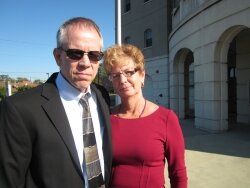 Early in the trial, Justine's parents Steve and Heidi Swartz stood outside the courthouse and expressed hope the jury would find Abshire guilty.Courteney Stuart
Early in the trial, Justine's parents Steve and Heidi Swartz stood outside the courthouse and expressed hope the jury would find Abshire guilty.Courteney Stuart -
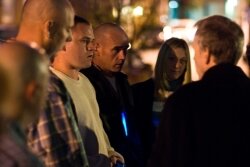 At a vigil on the one-year anniversary of Justine's death, Justine's father Steve Swartz, right, spoke with his former son-in-law Eric Abshire, center left in white sweater.File photo by Jay Kuhlmann
At a vigil on the one-year anniversary of Justine's death, Justine's father Steve Swartz, right, spoke with his former son-in-law Eric Abshire, center left in white sweater.File photo by Jay Kuhlmann -
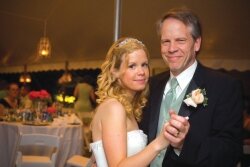 Justine dances with her father at her May 28, 2006 wedding. On October 25, a jury found her husband, Eric Abshire, guilty of her first degree murder.Family photo
Justine dances with her father at her May 28, 2006 wedding. On October 25, a jury found her husband, Eric Abshire, guilty of her first degree murder.Family photo -
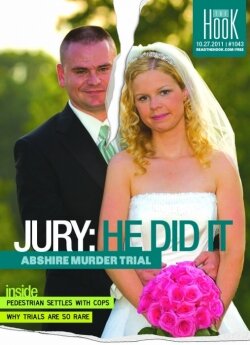
"There's a verdict!"
The cry at the Orange County Circuit Court at around 4:20pm on Tuesday, October 25 brought family and friends of the late Justine Swartz Abshire racing up to the third floor courtroom, terrified that they'd hear an acquittal after the jury deliberated less than two hours.
"I've waited so long for this to be right," sobbed Justine's maternal aunt Tracie Rossman inside the courtroom as she waited for return of the four-man, eight-woman panel. "It better be right."
Legal analyst David Heilberg says a jury's quick return is often good news for the prosecution, but not always.
"There are some cases where they go out and are back in five minutes with an acquittal," he says. "The only predictable thing about a jury is its unpredictability."
At 4:38pm, with the jury in place in two rows of chairs in front of Judge Daniel Bouton's bench, the court clerk read aloud words the Swartzes have waited five years to hear: "Guilty of first degree murder."
The pronouncement prompted several of the victim's family members to sob audibly; and Bouton, who'd given prior warning about controlling emotions, briefly stopped the proceedings to give several women time to compose. Defendant Eric Abshire's brother, Jesse, sat silently absorbing the news, as did Abshire, who remained motionless.
Now, two jurors reveal it was the totality of the evidence that eventually swayed the jury to convict Justine's 36-year-old widower of her brutal 2006 slaying.
"The second and third day, I gave him the real benefit of the doubt," says juror Steven Sage, a 52-year-old military veteran, former coal-mine worker, and truck driver. As the evidence presented by the prosecution mounted, Sage's doubts about Abshire's innocence grew.
"The more it got into it," Sage says, "the more stuff kept not making sense the way it should have."
Juror Michelle Hooper agrees. The 44-year-old professional seamstress and interior decorator says she didn't let her role as mother of two college-aged daughters influence her feelings about Abshire, who she believed was innocent until contrary evidence seemed overwhelming.
Certain details stood out, Sage says, starting with Justine's car. The 27-year-old schoolteacher supposedly called her husband to report engine trouble early on the morning of November 3, 2006, and her 2002 Ford Mustang was found nearly 700 feet west of her body on Taylorsville Road in Barboursville. Investigators had no trouble turning it on at the scene, and technicians who subsequently examined it could find no mechanical problem.
"When a car don't start, it don't start," says Sage.
Abshire's behavior at the scene caused additional juror suspicion, says Sage, recalling Abshire's explanation that he sat and cradled his wife's broken body before running to knock on doors rather than immediately seeking help by calling 911 with the cell phone in his pocket.
"Everybody's reaction is not the same," Sage acknowledges of a traumatic situation, but Abshire's delay in seeking help struck Sage as unbelievable, particularly given Abshire's military experience.
"You're a Marine," he says of Abshire. "You've been trained."
Hooper says that the mostly bloodless scene, which prosecutors claimed was proof she'd been killed elsewhere, was "huge."
"We all know that head wounds, mouth wounds, bleed profusely," says Hooper. "There should have been blood all over her clothing, all over the pavement, everywhere."
And the fact that Abshire claimed to have been visiting his ailing mother in a Charlottesville hospital until 11:30pm when cell phone records and testimony from his own brother placed him much closer to the scene in Ruckersville by 10pm was another major blow to the defense.
"No way he was at the hospital at 11 o'clock," says Sage, who worked in the Army Signal Corps for 11 years and didn't buy the defense's suggestion that a cell phone in downtown Charlottesville would bypass several intervening towers to bounce off a tower located about 15 miles to the north.
The jury, Sage says, didn't punish Abshire for not taking the stand but were particularly unimpressed with a private investigator hired by the defense.
"When your investigator comes up and he can't bring anything that we didn't already know," says Sage. "That blew our minds."
Sage scoffed at a scenario laid out by the defense-hired forensic pathologist who claimed an unnoticed broken neck explained the lack of blood on the scene and in body cavities. He notes that while some jurors were impressed with the pathologist's credentials, the money received for the testimony– at least $7,400– stood out.
"If I want to, I can take anything you write, anything you look at, and make you see something that is or is not there," says Sage.
Defense witnesses weren't the only things that failed to resonate.
Both Hooper and Sage say that jurors actually discounted the state's star witness, a parade float creator who told a tale of unwittingly helping a stranger with an out-of-gas car– a scenario that would have been the only evidence directly connecting Abshire to the staged scene.
"It was convenient, and it would help to explain the car and everything," says Hooper, "but whether he was a credible witness or not, we had enough other evidence that we could convict even without that."
Also disregarded in deliberations, Sage says, were the 43 phone contacts between Abshire and the mother of his two children on what is now believed to be the day of Justine's death, November 2, since the jury couldn't know the content of most of those conversations.
"They've got two kids," Sage says. "One of them could have been sick. That's the way life goes."
However, when that woman, Allison Crawford, testified that Abshire asked her if they had any future together less than two hours before he'd report finding Justine's body, jurors perked up.
"It was something you don't ask your ex-girlfriend if you've been married five months," Sage notes.
After the jury left the courtroom to begin deliberation at 2:44pm, Sage says, they first picked a foreperson, then took a show of hands. They were already convinced of Abshire's guilt, but a few had some questions, Sage says, about the definition of circumstantial evidence. They briefly returned to the courtroom where Judge Daniel Bouton told them they'd receive no further assistance and then sent them back to the jury room.
"We had so many notes," Sage says, recalling an intense if relatively brief review of the 93 items of evidence that included pulling telephone records and pictures out, and listening to Abshire's recorded interviews with police.
"It wasn't like we didn't go back over it," he says.
Shortly after 4pm, the jurors were "110 percent sure he done it," says Sage; but issuing the verdict wasn't easy, particularly when they thought about Abshire's two daughters, aged 12 and 16, who'd been in the courtroom on several occasions including that day.
Prior to the defense's closing argument, Abshire beamed at his daughters and said something this reporter could not hear. However, a member of the gallery, sitting closer, says it was a statement of optimism.
"He said, 'Party tonight,'" says that court watcher.
The jurors say they feared that the girls would be in the courtroom when they delivered the verdict, but they overcame their discomfort.
"He didn't have any remorse for them or he wouldn't have done it to start with," says Sage, and Hooper, too, says she knew the verdict would be difficult for the children.
"They're not going to understand why he was convicted," says Hooper, adding that Abshire's violent act left no other choice. "We protected them from possible future harm because he obviously has shown he's capable of violence."
Their mother, Allison Crawford, did not return the Hook's call.
Prior to deliberations for the sentence recommendation, Justine's mother, Heidi Swartz, took the stand to offer a victim impact statement that left several jurors wiping tears.
"There hasn't been a day in five years when one of us hasn't been crying or hurting," Swartz said through sobs, citing collateral damage: the break-up of her 36-year-marriage, the loss of her business and subsequent bankruptcy, and two months of hospitalization for post traumatic stress.
She recalled her excitement and pride as the mother of the little blond girl who'd grow up to become a beloved kindergarten teacher.
"You can never imagine that something so horrible could happen to them," she said in a choked voice.
By 5:30pm, the jury handed out the decree: life in prison.
The two jurors interviewed say they have no regrets about the verdict or the knowledge that Abshire will likely live out his days behind bars.
"He got away with it for three or four years," says Sage. "It caught up with him."
For the Swartzes, Justine's parents Heidi and Steve, and her younger sister Lauren, there is tremendous relief.
"It was clear to me from the very start that the jury was very engaged, very attentive, the entire trial," says Heidi Swartz, expressing gratitude. "I know it must have been very painful and difficult to hear the story that they did, and I know that a little part of Justine will always be a part of their lives, too."
"I will never forget it," says Hooper, "but I also feel like I was able to be a part of bringing about justice to Justine's murder and to be able to be a part of giving her family closure. That means a lot to me."
While the family is still absorbing the verdict, Lauren Swartz says it's changed their focus.
"We've spent the last five years focusing on the last six hours of her life. We had to focus on the brutality and every detail so we could come to a place where we could have enough peace to focus on the 27 years of her life," says Lauren. Now, she says, "we'll find more positive ways to memorialize her, and not the place where her body was found."
As for an appeal, Abshire– who entered court Tuesday morning in a suit but who left in handcuffs and shackles– has 30 days to file. However, legal analyst Heilberg says the appeals clock doesn't start ticking until after his formal sentencing hearing January 12.
There also must be a basis for appeal, but that, says Heilberg, can be a difficult to find.
"You have to show that a mistake was made that made the trial so unfair that it affected the result," he says, "or evidence came in, or didn't, that was so important that it could have changed the result."
If there was a Constitutional issue, Abshire could appeal to the U.S. Supreme Court, but Heilberg sees that as unlikely to succeed in even being heard.
"You have a better chance of being struck by lightning," he says.
Outside the courthouse following the verdict, Orange Commonwealth's Attorney Diana Wheeler, who co-tried the case with assistant Commonwealth's Attorney Rick Moore, stressed the incredible effort and thousands of hours of investigation and prosecution.
Defense attorney Weber expressed appreciation to judge and jury. While calling the trial "fair," he did not respond to questions submitted later on any plans for appeal.
–gently edited for print 1:53pm, Tuesday, November 1

17 comments
I sincerely hope the Commonwealth is taking a long hard look at the business partner who later 'coincidentally' bought the vehicle Abshire most likely stole to move Justine's body.
Well done, jurors. Put the garbage in the can.
""You have a better chance of being struck by lighting," he says.
Do they mean lightning?
Also, I thought this sentence wording was interesting: "However, when that woman, Allison Crawford, testified..."
"That woman"? Really? :D Kind of harkens back to the days of Bill Clinton.
Anyway, I'm glad the verdict was guilty, as it seemed abundantly clear that he was. In every photo I've seen of Abshire he struck me as a smarmy looking sociopath.
@Boooo! Thanks for catching the "lightning" typo. It's been fixed. --Courteney Stuart
booo!, I think you've missed the grammatical justification for the sentence that you question ("However, that woman, Alison Crawford,...). The writer refers to her as "that woman" because in a preceding paragraph, Alison Crawford was referred without her name--see below:
"Also disregarded in deliberations, Sage says, were the 43 phone contacts between Abshire and the mother of his two children..."
So the "that" is simply doing the job of referent.
I agree that calling her "that woman" WITHOUT having the preceding nameless reference would have sounded very Bill Clinton.
The trial is over, it was a good verdict.
But, I can tell Steven Sage he is dead wrong. Last year I got rid of a perfectly good Chevrolet Impala that wouldn't start 1 out of 100 times. Come back 30 minutes later and it would fire right up. It would also die right in the middle of the highway for no apparent reason. But, then again, it would fire right up by the time a tow truck got there.
Nobody ever could figure out what was wrong with this car. The only way to repair it would have involved replacing the ECM (computer), starter, ignition switch, and several other modules and relays. I got rid of it and bought my wife a new Impala.
Gasbag, the moral of your story should have been, ".....I got rid of it, and bought my wife something other than a Chevy."
Deleted by moderator.
I agree with gasbag on the car thing. I have been an automotive technician for 20 years and cannot tell you how many times I have had cars towed in as a no start that started right up. There is no tests possible to prove that the car actually did not cut off.
Defense attorney Weber walks another one to the penitentiary. The Dolphins win more than that guy does.
Most criminal defense attorneys don't win that often because the Commonwealth does not take cases they think they can lose to trial very often.
Create a few jobs- professional jurors..................
I'm surprised the Abshire boy didn't try to hit on 'Ol Diana.
Eric selects women who are weak & unable to think for themselves. In court I saw the mother of his two daughters leave the court room because Eric instructed her to go. She is still today doing anything he tells her to do. She will always be under his spell. Maybe the two daughters will grow up & wise up and leave his sick ass to rot in prison. Shame Jessie isn;t joing him there. Great job Mrs. Wheeler, Special Agent Mike Jones. I bet Eric respects you now.......lol
more indictments to come..... stay tuned!
I was hoping the jurors would discuss why they recommended life and not the death penalty. I assume there's a higher burden of proof than the mostly circumstantial evidence here, but I'd like to know their thoughts. Courteney, if you write any more stories on this topic, try to shed some light on the recommended sentence.
Only Capital Murder carries the death penalty. This wasn't considered a capital offense (unfortunately)